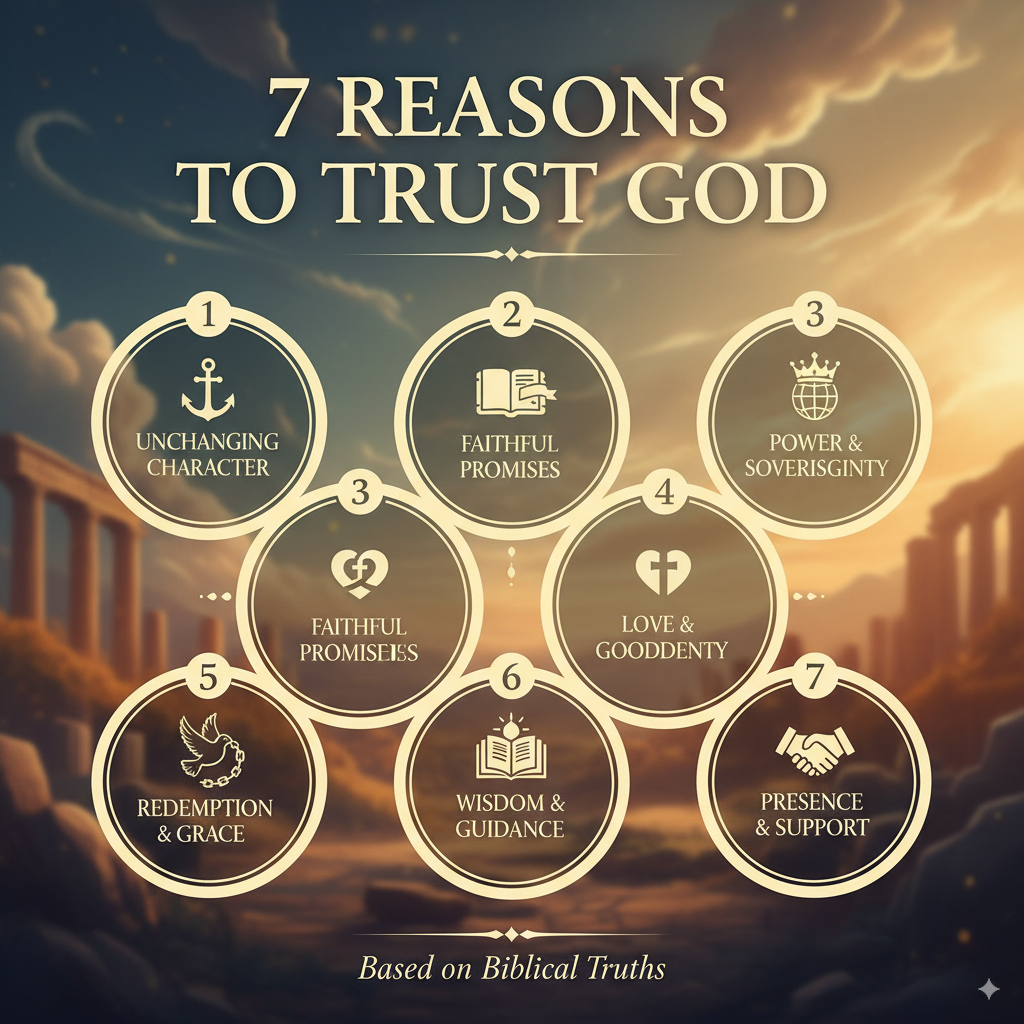The Bible offers numerous reasons to trust God. Here are seven of them:

1. God’s unchanging character: The Bible consistently portrays God as being the same yesterday, today, and forever. (Heb 13:8) His character, which includes His love, righteousness, justice, and faithfulness, does not waver. This consistency provides a stable foundation for trust.
 Malachi 3:6 (NIV):“I the Lord do not change. So you, the descendants of Jacob, are not destroyed.”
Malachi 3:6 (NIV):“I the Lord do not change. So you, the descendants of Jacob, are not destroyed.”
This verse directly states God’s unchanging nature. The context here is important; because God does not change, His covenant promises (even amidst our unfaithfulness) remain firm, preventing the complete destruction of His people. His steadfastness is a source of salvation and preservation.
Heb 13:8 (NIV):“Jesus Christ is the same yesterday and today and forever.”
While focusing on Jesus, this verse points to the unchanging nature of the second person of Jesus, confirming that the very character and actions of God revealed in Christ are constant throughout all time. His love, power, and truth are eternally consistent.
James 1:17 (NIV):“Every good and perfect gift is from above, coming down from the Father of the heavenly lights, who does not change like shifting shadows.”
This beautiful verse emphasizes that God is the source of all good things. More importantly, it contrasts His unchanging nature with “shifting shadows,” which constantly move and change. God is not fickle or unpredictable; His goodness is constant and reliable, like the sun that never wavers.
Psalm 102:25 (NIV):“In the beginning you laid the foundations of the earth, and the heavens are the work of your hands. They will perish, but you remain; they will all wear out like a garment. You will change them like a robe, and they will pass away, but you remain the same, and your years will have no end.”
This psalm powerfully contrasts the temporary nature of creation with the eternal, unchanging nature of God. Everything else will decay and pass away, but God’s being, character, and power are without end and without alteration. He is the ultimate constant in a world of change.
Numbers 23:19 (NIV):“God is not human, that he should lie, not a human being, that he should change his mind. Does he speak and then then not act? Does he promise and not fulfill?”
This verse speaks to God’s integrity and faithfulness, which are rooted in His unchanging character. Unlike we humans who might lie or change our minds, God’s word is always true, and His intentions are steadfast. This means His promises are completely trustworthy.
Why God’s Unchanging Character Matters
God’s unchanging character is a profound source of comfort, security, and hope for believers.
Foundation for Trust: In a world where everything is constantly in flux—people change, circumstances change, feelings change—God remains the one constant. We can trust His promises, His love, and His justice because they are rooted in who He always is, not in temporary moods or conditions.
Assurance of His Love: If God’s character never changes, then His love for us, demonstrated most clearly through Christ, also never changes. It’s not dependent on our performance or our feelings, but on His eternal nature.
Reliability of His Word: Because God does not change His mind, His Word (the Bible) is absolutely reliable. What He has revealed about Himself, about humanity, and about His plan for salvation stands true for all generations.
Hope for the Future: Knowing that God is unchanging means we can look forward with confidence to the fulfillment of all His prophecies and promises. His past faithfulness guarantees His future faithfulness.
In essence, God’s immutability (His unchanging nature) is one of the most comforting attributes of God, assuring us that He is eternally consistent in His holy, loving, just, and faithful character.
2. God’s faithfulness to His promises: Throughout scripture, God makes many promises to His people and is always shown to fulfill them. From the covenant with Noah to the promise of a Messiah, God’s track record demonstrates His reliability. states, “God is not human, that he should lie, not a human being, that he should change his mind. Does he speak and then not act? Does he promise and not fulfill?”

God’s faithfulness means He is utterly reliable, trustworthy, and true to His word. When God makes a promise, He will always fulfill it. This isn’t just a hopeful thought; it’s a verifiable truth demonstrated throughout the entirety of biblical history and personal experience.
Key Biblical Truths about God’s Faithfulness to His Promises:
God Cannot Lie:
Numbers 23:19 (NIV):“God is not human, that he should lie, not a human being, that he should change his mind. Does he speak and then not act? Does he promise and not fulfill?”
Titus 1:2 (NIV):“…in the hope of eternal life, which God, who does not lie, promised before the beginning of time…”
Unlike us humans who often lie, forget, or change our minds, God is inherently incapable of dishonesty. His very nature is truth. This means every promise He makes is backed by His flawless integrity. If He said it, it WILL happen.
His Promises Are Eternal and Unbreakable:
Psalm 98:34 (NIV):“I will not violate my covenant or alter what my lips have uttered.”
Isaiah 55:11 (NIV):“so is my word that goes out from my mouth: It will not return to me empty, but will accomplish what I desire and achieve the purpose for which I sent it.”
God’s promises are not temporary agreements; they are eternal covenants. He doesn’t just make promises; He keeps them with unwavering determination. His word has power and will always achieve its intended purpose.
Demonstrated Through History (Examples):
Promise to Abraham: (Gen 17) God promised Abraham countless descendants and that through him, all nations would be blessed. Despite Abraham and Sarah’s old age and initial barrenness, God miraculously provided Isaac, and ultimately, the nation of Israel was born, and Jesus Christ came through their lineage, fulfilling the blessing to all nations.
Deliverance from Egypt: (Exodus 12) God promised to redeem Israel from slavery in Egypt with an outstretched arm. He did so through the plagues and the parting of the Red Sea.
Coming of the Messiah (Psalm 22): Hundreds of years before Jesus’ birth, death, and resurrection, the Old Testament prophesied details about Him. Every prophecy was fulfilled precisely.
The entire biblical narrative is a testament to God’s faithfulness. Time and again, He made impossible promises and then brought them to pass, often in ways that highlighted His divine power and wisdom. These historical fulfillments build confidence in His future promises.
His Faithfulness Even in Our Unfaithfulness:
2 Timothy 2:13 (NIV):“if we are faithless, he remains faithful, for he cannot disown himself.”
This is a truly remarkable aspect of God’s faithfulness. Even when we falter, doubt, or fail to keep our end of a commitment, God remains true to His character and His word. His faithfulness is not dependent on our performance but on His unchanging nature.
Why God’s Faithfulness to His Promises Matters to Us:
Security and Hope: In a world filled with uncertainty and broken promises, God offers ultimate security. We can place our hope fully in Him because His word is absolutely certain.
Foundation for Prayer: We can boldly approach God in prayer, reminding Him of His promises, knowing that He delights in fulfilling them for His glory and our good.
Encouragement in Trials: When life is difficult and His promises seem far off, remembering His historical faithfulness gives us strength to persevere, knowing He will see us through.
Motivation for Obedience: Understanding that God is faithful motivates us to obey Him, not out of fear, but out of trust that His commands are for our ultimate good, leading to the blessings He has promised.
Assurance of Salvation: The greatest promise fulfilled is the promise of salvation through Jesus Christ. If God was faithful to send His Son, we can be absolutely certain He will be faithful to complete the work of salvation in those who believe.
God’s faithfulness to His promises is a bedrock truth of Christianity. It assures us that our God is not a God of empty words, but of unfailing action and steadfast commitment. We can trust Him implicitly with our present and our eternal future.
3. God’s power and sovereignty: The Bible reveals God as the all-powerful Creator and Sustainer of the universe. He is sovereign over all things, meaning nothing is beyond His control or ability. This power ensures that He can accomplish what He purposes and keeps His promises.

God’s power and sovereignty are fundamental aspects of His character, woven throughout the fabric of creation and history.
God’s Power:
Imagine the vastness of the universe – billions of galaxies, each containing billions of stars. The sheer scale is almost incomprehensible to us. Yet, the Bible tells us that God spoke it all into existence. “By the word of the Lord the heavens were made, their starry host by the breath of his mouth” (Psalm 33:6). This isn’t just a powerful act; it’s a demonstration of absolute power, power that creates out of nothing!!
This power isn’t limited to creation. It’s also seen in His ability to sustain all things. states that (Col 1:17) “in him all things hold together.” Think of the intricate balance of ecosystems, the laws of physics, the very beating of your heart – all are upheld by His continuous power.
Furthermore, God’s power is demonstrated in His ability to perform miracles, to intervene in the natural order. From parting the Red Sea to raising the dead, these acts showcase a power that transcends human limitations and natural laws. It’s a power that can achieve anything He wills, for “nothing is impossible with God” (Luke 1:37).
God’s Sovereignty:
Sovereignty refers to God’s supreme authority and control over all things. It means He is the ultimate ruler, and His will is always accomplished. This doesn’t mean we don’t have free will, but rather that even within our choices, God’s overarching plan and purpose are at work.
Consider the course of human history. Empires rise and fall, leaders make decisions, and societies evolve. Yet, tells us that (Dan 2:21) “He changes times and seasons; he deposes kings and raises up others.” This illustrates God’s active involvement and control over the affairs of nations and individuals.
His sovereignty is also evident in His meticulous planning and execution of salvation. From the promise of a redeemer in Genesis to the sacrifice of Christ on the cross, every event was part of His divine, sovereign plan to reconcile humanity to Himself. says that God (Eph 1:11) “works out everything in conformity with the purpose of his will.”
In essence, God’s power is the ability to do whatever He wills, and His sovereignty is the right and exercise of that will over all creation. They work in perfect harmony, assuring us that He is in control, He is capable, and His purposes will ultimately prevail.
4. God’s love and goodness: The Bible emphasizes God’s immense love for humanity, most profoundly demonstrated through the sacrifice of Jesus Christ (John 3:16). His goodness is evident in His provision, compassion, and desire for our well-being. This selfless love inspires trust.
 God’s love and goodness are two of His most comforting and foundational attributes, offering profound assurance and hope. They are inextricably linked, with His goodness often being the expression of His love.
God’s love and goodness are two of His most comforting and foundational attributes, offering profound assurance and hope. They are inextricably linked, with His goodness often being the expression of His love.
God’s Love:
When we speak of God’s love, we’re talking about something far deeper and more expansive than human emotion. The Bible uses various terms for love, but the one most often associated with God’s perfect, self-sacrificial love is agape. This is a love that gives, seeks the highest good of the beloved, and is not based on the worthiness of the object.
Sacrificial Love: The ultimate demonstration of God’s love is found in : “For God so loved the world that he gave his one and only Son, that whoever believes in him shall not perish but have eternal life.” This was a voluntary, costly act born purely out of His desire for humanity’s salvation. It wasn’t because we earned it or deserved it, but because He is love itself.
Unconditional Love: states, (Rom 5:8) “But God demonstrates his own love for us in this: While we were still sinners, Christ died for us.” This highlights the unconditional nature of His love. It doesn’t wait for us to be perfect; it reaches out to us in our imperfection.
Eternal Love: declares, (Jeremiah 31:3) “I have loved you with an everlasting love; I have drawn you with unfailing kindness.” God’s love is not fleeting or subject to change. It is constant, steadfast, and endures forever. It’s a love that pursues, redeems, and never gives up.
God’s Goodness:
God’s goodness refers to His inherent moral excellence, kindness, benevolence, and generosity. It means that everything He is and everything He does is good. There is no shadow of evil or malice in Him.
Creator’s Provision: His goodness is evident in creation itself. Psalm 104 beautifully describes how God provides for all His creatures – from the grass for the livestock to the food for humans, and even the young lions seeking their prey. He generously sustains life. “The Lord is good to all; he has compassion on all he has made” (Psalm 145:9).
Moral Standard: God’s goodness is the absolute standard for all morality. His laws and commands are not arbitrary rules, but expressions of His good nature, designed for our flourishing. When we follow His ways, it leads to good outcomes, reflecting His character.
Faithfulness and Mercy: His goodness is seen in His faithfulness to His promises and His abundant mercy. Even when we fail, His goodness leads Him to extend grace, forgiveness, and new opportunities. reminds us, (Lamentations 3:22) “Because of the Lord’s great love we are not consumed, for his compassions never fail. They are new every morning; great is your faithfulness.”
In summary, God’s love is the driving force behind His desire for our well-being and relationship, and His goodness is the consistent, perfect expression of that love in all His actions, provisions, and character. Together, they form the bedrock of our trust and hope in Him.
5. God’s redemption and grace: Through Jesus Christ, God offers redemption from sin and eternal life. The grace shown to undeserving humanity highlights His merciful nature and His desire to restore us to a relationship with Him. This act of salvation is a powerful reason to trust in His character and plan.
God’s redemption and grace are central to our faith. Redemption refers to God’s act of buying us back from the slavery of sin. It’s like a ransom paid to free captives. Through Jesus Christ’s sacrifice on the cross, God paid the ultimate price to set us free from the penalty and power of sin, offering us a new life.
Grace, on the other hand, is God’s unmerited favor. It’s a gift we don’t deserve and could never earn. (2 Tim 1:9). It was given to us before the beginning of time. This means that God, out of His infinite love and mercy, chooses to extend forgiveness, blessing, and relationship to us, even though we are undeserving sinners.
Together, redemption and grace highlight the incredible depth of God’s love. He not only provided a way out of our predicament (redemption) but did so purely out of His generous, undeserved favor (grace). It’s a beautiful testament to His character and His desire for a relationship with you and me.
6. God’s wisdom and guidance: The Bible presents God as infinitely wise, with perfect understanding of all things. He offers guidance through His Word and the Holy Spirit, leading believers in paths of righteousness. Trusting His wisdom means believing that His ways are always best, even when we don’t understand them.
God’s wisdom and guidance are crucial aspects of His relationship with humanity. God’s wisdom is perfect and all-encompassing, far surpassing human understanding. It is an inherent part of His nature, meaning He always knows the best path, the ultimate truth, and the right way to act in every situation. Unlike our wisdom, which is often limited by knowledge and perspective, God’s wisdom is infinite and eternal.
God’s guidance is the way He leads and directs us through life, helping us navigate challenges, make decisions, and walk in His will. This guidance can come in many forms: through His Word (the Bible), prayer, the Holy Spirit’s promptings, the counsel of wise believers, and even through circumstances. When we seek God’s wisdom and guidance, we are inviting His perfect understanding to illuminate our steps, ensuring that we walk on a path that leads to His glory and our ultimate good. It’s about trusting that the One who created everything knows what is best for His creation.
7. God’s presence and support: The Bible assures believers of God’s constant presence and support in their lives. He is described as a refuge and strength, an ever-present help in trouble (Psalm 46:1). This promise of never being alone and always having divine support fosters deep trust.